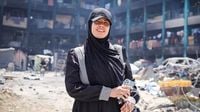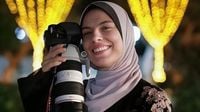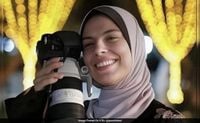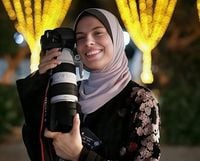Fatima Hassouna, a 25-year-old Palestinian photojournalist, was killed in an Israeli airstrike on April 16, 2025, just days before her wedding. The strike, which hit her home in northern Gaza, also claimed the lives of ten family members, including her pregnant sister. This tragic event has highlighted the ongoing violence in Gaza, where the death toll has surpassed 51,000 since the conflict reignited following the October 7 attack.
Hassouna, who had spent 18 months documenting the atrocities of war, was known for her powerful imagery that captured the resilience and suffering of the Palestinian people. In an Instagram post from August 2024, she expressed her desire for her death to resonate beyond mere statistics, stating, "If I die, I want a loud death. I don’t want to be just breaking news, or a number in a group. I want a death that the world will hear, an impact that will remain through time, and a timeless image that cannot be buried by time or place." Her poignant words foreshadowed the tragic reality that would soon unfold.
Just one day before her death, it was announced that a documentary focusing on her life and experiences during the ongoing conflict would premiere at a French independent film festival running parallel to the prestigious Cannes Film Festival. The film, titled Put Your Soul on Your Hand and Walk, was directed by Iranian filmmaker Sepideh Farsi. Farsi described Hassouna as "my eyes in Gaza … fiery and full of life" and expressed her devastation upon hearing the news of Hassouna's death, which she had learned about just hours after inviting her to the film screening.
Hassouna's work had garnered significant attention, with her photographs documenting the harsh realities of life in Gaza shared widely on social media platforms. The Palestinian Journalists’ Protection Center (PJPC) mourned her loss, describing the airstrike that killed her as a "crime" against journalists and a violation of international law. They stated, "Fatima's powerful photos documenting life under siege were published globally, shedding light on the human toll of the war." This sentiment was echoed by Francesca P. Albanese, the United Nations Special Rapporteur on the Occupied Palestinian Territories, who remarked that Hassouna's "crime was to chronicle the genocide through powerful articles and photos."
According to reports, the Israeli military claimed that the airstrike was a targeted attack on a Hamas operative involved in attacks against Israeli soldiers and civilians. The Israel Defense Forces (IDF) stated that measures were taken to minimize civilian casualties, but the collateral damage from the strike has raised serious questions about the ethics of such military actions.
In the wake of Hassouna's death, her family has been left to grapple with the tragedy. Her parents survived the strike but are in critical condition, receiving treatment in an intensive care unit. Cousin Hamza Hassouna recounted the chaos of the attack to CNN, stating, "I was sitting when suddenly two rockets fell, one next to me and one in the living room. The house fell on us, and everything was a disaster." This firsthand account underscores the terror that many families in Gaza experience on a daily basis.
The impact of Hassouna's death has resonated beyond her immediate community. Her passing is part of a broader trend of violence against journalists in conflict zones, with the PJPC reporting that 212 journalists have died in the Gaza Strip since October 7, 2023. This staggering figure highlights the dangers faced by those who strive to document the truth in war-torn regions.
In a poignant tribute, the Cannes Acid Film Festival stated, "Her smile was as magical as her tenacity. Bearing witness, photographing Gaza, distributing food despite the bombs, mourning and hunger. We feared for her." The festival's recognition of Hassouna's work serves as a reminder of the importance of storytelling in the face of adversity.
Hassouna's last Facebook post, shared just days before her death, featured a series of photographs of Gaza fishermen by the sea, accompanied by a short poem reflecting her love for her homeland and its beauty. It read, "From here you get to know the city. You enter it, but you don’t leave, because you won’t leave, and you can’t." This poetic expression encapsulates the deep connection she felt to her city, even amidst the turmoil.
The ongoing conflict in Gaza has seen an escalation in violence, particularly following the collapse of a ceasefire in March 2025. Israeli airstrikes have intensified, resulting in numerous casualties, including the recent deaths of at least 30 people in a single day. The Israeli government maintains that its military actions are necessary to combat terrorism, but many observers argue that the resulting civilian casualties raise serious moral and legal concerns.
As the world reflects on the loss of Fatima Hassouna, her legacy as a voice for the voiceless and a chronicler of the human experience in Gaza will undoubtedly endure. Her story, captured through her lens and now immortalized in film, serves as a powerful reminder of the resilience of the human spirit in the face of unimaginable hardship. In a world where the narratives of conflict are often overshadowed by politics and power, Hassouna's images and words resonate as a call for empathy and understanding.
In the end, Hassouna's desire for a "loud death" has been tragically fulfilled, as her story continues to echo through the lives she touched and the truths she revealed. The international community is left to grapple with the implications of her death and the ongoing plight of the Palestinian people, as they seek to find a voice amidst the chaos.










